18+ | Commercial Content | T&Cs apply | Begambleaware.org

Evolution of the Premier League logo since 90’s
The history of football is a long one but the sport itself has always been very popular, right from the very start. Today, football is the most popular sport in the world, with fans in every country that go to matches and tune in to watch the major football leagues and competitions.
The most popular league today, by all standards, is the English Premier League (EPL). EPL, or Premiership, as many call it, is one of the most profitable leagues despite being very young as well. But before we start with our detailed history of the EPL, let’s take a quick look at the origins of football in the UK.
Football – The Father of All Sports
Contents
You probably know already that football, in the form it is played today, has been invented in England in the 19th century. But other similar games have been played much earlier, in ancient Greece and China. There are even traces of a game played with a ball made of rubber in South America during the Mayan civilization, on the stone courts.
Most of these ancient ballgames involved using your hands as well, just like the game that appeared in England in the 12th century. Played on roads and meadows, the game involved kicks and punches with the fist. As expected, it was much more violent than the football today, perhaps resembling rugby a bit more than football. The game also involved many people, like the game known as Calcio that was played in 16th century Florence.
This ballgame was forbidden in England due to its rough nature but it appeared on the streets again in the 17th century. And despite being banned once again in 1835, the game was already rooted amongst the people and some public schools.
The Birth of the Modern Game
The invention of the game as we know it today took some time. The ballgame played in England until the 19th century didn’t have a clear distinction between rugby and football. The rules also varied from one part of the country to another.
Two schools were particularly important in the development of the game. These schools were Rugby and Eton. At Rugby, the rules allowed using hands, so the modern rugby draws its origins from there. Meanwhile, the game at Eaton was played only with feet, so it is the closest predecessor to the football in the modern sense.
The first official attempt at the unification of the football rules was in 1848 in Cambridge but it yielded no results. However, in 1863 in London, the first Football Association was formed and the rules of football prohibited the use of hands from then on. The meeting also brought the standardization of the weight and size of the ball. From then on, the game would be spread to the English colonies and gain worldwide popularity.
The First Football Clubs

There were football clubs in England that dated back to the 15th century. However, these clubs were not organized and had no official status. Therefore, it is hard to determine which football club was the first to exist. Some sources suggest that the first club was the Foot-Ball Club from Edinburgh and dates back to 1824.
However, the first official football clubs in the UK were formed by former students. The first club of this kind was formed in 1855 in Sheffield. The oldest professional football club in the UK is Notts County, formed in 1862. The club still exists today and currently competes in the National League, the fifth tier competition in England.
English Football League – The Predecessor to the EPL
The first official football league in the world was the English Football League (EFL), founded in 1888. The league came as a result of the FA allowing professionalism after sticking to the amateur system by which the FA Cup was played from the start in 1871. But after many clubs started to break the amateur rule and pay people to play, the FA finally allowed the clubs to become fully professional in 1885.
After three years of negotiations, the EFL was finally formed. The premier edition of the competition featured 12 clubs – Aston Villa, Accrington, Bolton Wanderers, Blackburn Rovers, Burnley, Everton, Derby County, Notts County, Stoke, Preston North End, Wolverhampton Wanderers and West Bromwich Albion.
The first-ever champion of the English Football League was Preston North End and they were the first team to win the double after also winning the FA Cup in 1888.
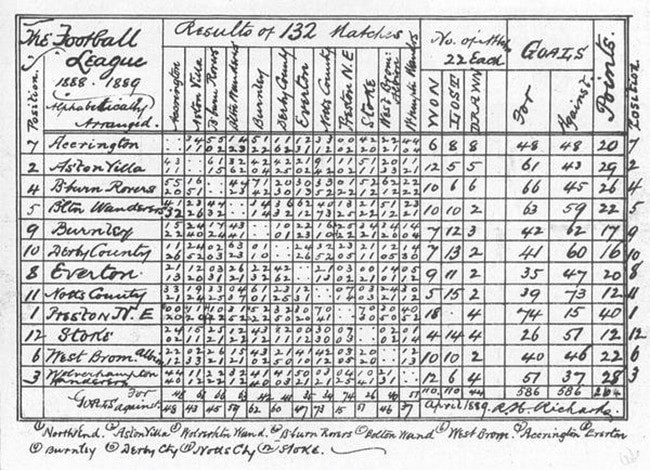
Results of the First English League season
Expansion and Most Successful Clubs
The EFL went through many changes during its formative years, especially when it comes to the number of teams and the rules. By the early 20th century, the EFL consisted of 20 clubs, while other clubs were playing the Second Division, fighting for the promotion to the EFL, while the clubs in the EFL fought to avoid relegation to the Second Division.
During its many years, until the formation of the English Premier League in 1992, 23 teams have won the English Football League. The most successful club was Liverpool, with 18 EFL titles. Arsenal has won 10 EFL titles, Everton 9, Manchester United and Aston Villa 7, Sunderland 6, while the rest of the clubs won 4 or fewer league titles.
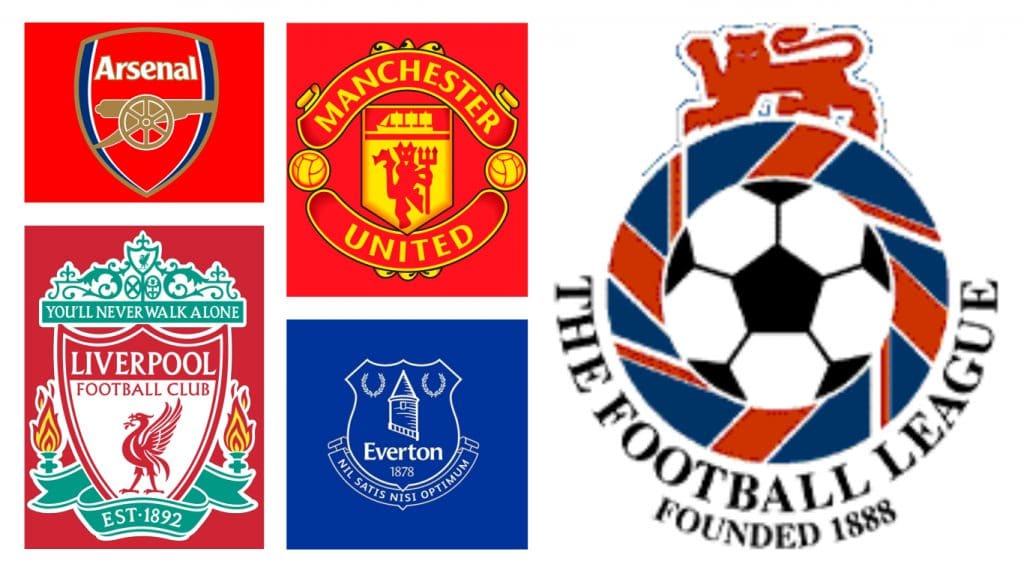
Top clubs from the English Football League between 1888 and 1992
The Formation of European Competitions and English Representatives
After the 2nd World War, European clubs started to compete in the European Cup which was founded in 1955. The premier season of the European Cup was played without English clubs but Manchester United joined the competition the next year as the English champion, against the wishes of the FA who viewed the European Cup as a “distraction”.
The first decade of the competition was dominated by Real Madrid, while Benfica, Intern Milan and Milan won a few of the titles in the early years. The first English team to win the European Cup was Manchester United, who won the title in 1968. A total of 5 clubs from England managed to win a title in the European Cup and its successor Champions League – Manchester United, Liverpool, Aston Villa, Nottingham Forrest, and Chelsea. The most successful club is Liverpool with 6 titles.
History of the English Premier League
Despite having significant success in Europe in the 70s and early 80s, the second half of the 1980s was a very troubling time for English football clubs and English football in general. Troubles with hooligans and crumbling stadiums, poor facilities, and the bad financial position of English clubs who were only getting a small portion of the TV revenue marked the begging of the end of the English Football League.
The final nail in the coffin of the long-lasting league came after the tragedy at the Heysel Stadium in 1985, when 39 spectators died and over 600 were injured after a wall collapsed during the final between Juventus and Liverpool.
The incident occurred because Liverpool supporters breached Juventus fans, who tried to escape over the wall. Some of the fans that were standing near the wall were crushed, while others were injured after the wall ultimately collapsed. This led to a ban from European competition for all English clubs for 5 years, which was the final sign that serious changes were necessary for English football to recover and thrive.
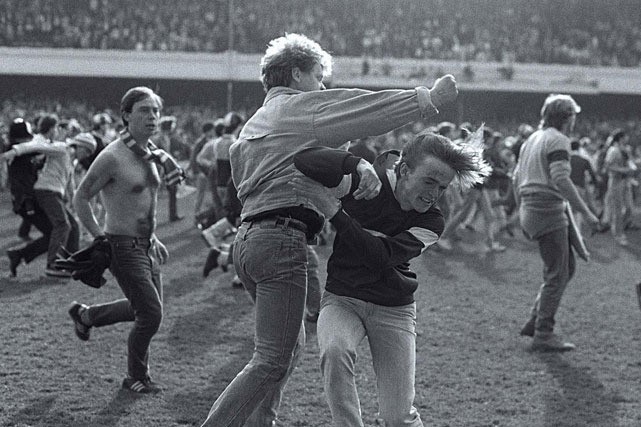
Origins of the EPL
The English Football League was behind La Liga and Seria A in attendance and revenues at the end of the 1980s, so talks of significant changes began among the clubs. It was in this period when major English clubs began to transform into real businesses, trying to maximise revenues by applying commercial principles to the management of the clubs.
This transformation led the owners of the top clubs to seek increases in revenue and power, threatening to leave the league if their demands aren’t met. They managed to do so, and in 1986 the teams received greater voting power and a better financial agreement that entailed them to taking half of the entire sponsorship and television revenue.
By 1988, the top teams were taking the larger share of the deal after they once again ten clubs threatened to leave the league and form their own “super league”. This time, they received 75% of the revenue from television rights, which meant a rise from around £25,000 per year in 1986 to over £600,000 in 1988. All of this laid ground for the formation of the English Premier League.
Foundation of the EPL
The previous attempts to break away from the EFL were not successful but at least they improved the revenue and voting power of the top teams. However, the teams saw a huge opportunity to create a more lucrative league for themselves after a meeting with the managing director of London Weekend Television (LWT) in 1990. Representatives of the “big five” were present at the meeting – Liverpool, Manchester United, Arsenal, Tottenham and Everton.
The new league would guarantee a larger share of TV revenue for the clubs, which is something that the “big five” wanted to hear. However, they also knew that they needed backing by the FA in order to make the league credible. Since the FA was not in best relations with the EFL, the FA supported the plan for the Premier League and promised to oversee the league.
At the end of the 1991 EFL season, the top clubs proposed the deal for the foundation of the new league that would be more lucrative for all clubs and bring more money overall, not just from the TV revenues.
On 17th July 1991, the Founder Members Agreement was signed by England’s premier clubs. The agreement promised commercial independence for the Premier League from the FA and the EFL, giving the league the freedom to negotiate its own sponsorships and broadcast rights.
Despite its role in the foundation, LWT ultimately lost the bidding for broadcast rights to BSkyB. The league signed the deal for£304 million over five years with this company, while the BBC was awarded the highlights package broadcast.
Rules and Regulations before the First Season
The FA Premier League was officially formed on May 27th, 1992. The Football League kept the lower three divisions for a while, but the top flight of English football was not under its jurisdiction for the first time after 104 years.
The competition format was kept the same – 22 clubs would compete for the Premiership title. Also, the promotion and relegation rules between the Premier League and First Division remained the same with the three teams relegated and promoted.
The teams that played in the first-ever season of the Premier League, the 1992-93 season, were Aston Villa, Arsenal, Blackburn Rovers, Coventry City, Crystal Palace, Chelsea, Everton, Ipswich Town, Liverpool, Leeds United, Manchester United, Manchester City, Middlesbrough, Nottingham Forest, Norwich City, Queens Park Rangers, Oldham Athletic, Sheffield Wednesday, Sheffield United, Southampton, Tottenham and Wimbledon.
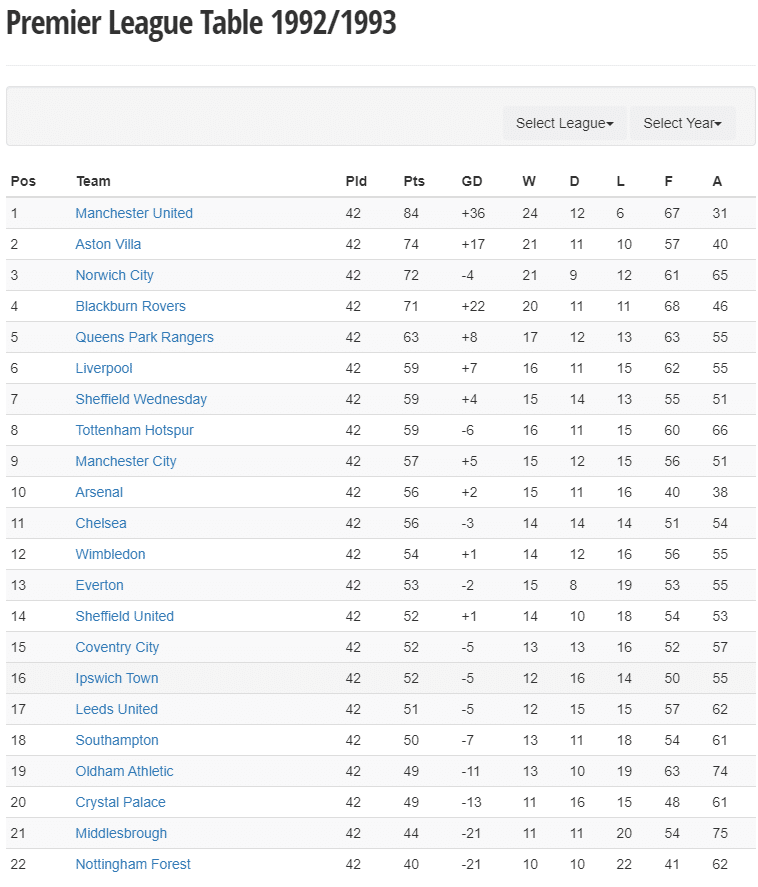
Getting Started
The first years of the Premiership were also the years of dominance for Manchester United. Despite the fact that the team has won its last title in 1967, the Red Devils have won the first-ever Premier League title with a 10-point difference over the runner-up, Aston Villa.
This marked the begging of a very successful era for the Manchester club since they have won 13 Premier League titles since the league’s inception, all under the guidance of Sir Alex Ferguson, the most successful manager in the EPL’s history.
The top scorer in the premiere season of the new league was Teddy Sheringham with 22 goals. Sheringham started the season with Nottingham Forest, scoring the first-ever goal for the club in the Premier League but he was sold to Tottenham just a week after for £2.1 million.
Bow before the Red Devils
After their first Premier League title, Manchester United won three of the next four titles. Overall, they have won four of the first 5 EPL titles. The team in those years featured some prominent English players like Garry Neville, Nicky Butt, David Beckham, Paul Ince, Andy Cole but also a few international stars like the goalkeeper Peter Schmeichel, Denis Irwin, Mark Hughes, Roy Keane, Ryan Giggs and Eric Cantona.
The only team that managed to break the dominance of the Red Devils in the first 5 seasons of the Premier League was Blackburn Rovers. Blackburn won the 1994-1995 season, the last season that featured 22 teams in the league. After this season, Premier League changed the format to feature 20 teams in the top division.
Before the start of the 94-95 season, Blackburn Rovers broke the transfer record when they paid £5 million for Chris Sutton, a 21-year old striker from Norwich City. The team coached by Kenny Dalglish secured the title on the last day of the season despite their 2-1 loss at Liverpool thanks to the fact that Manchester United couldn’t get the win at West Ham.
In the end, Blackburn Rovers become champions by a single point difference. The top goalscorer of the season was Blackburn’s Alan Shearer with 34 goals, the still-standing record for a single season he shares with Andrew Cole. Alan Shearer is also the top scorer in the history of Premier League with 260 goals on 441 matches.
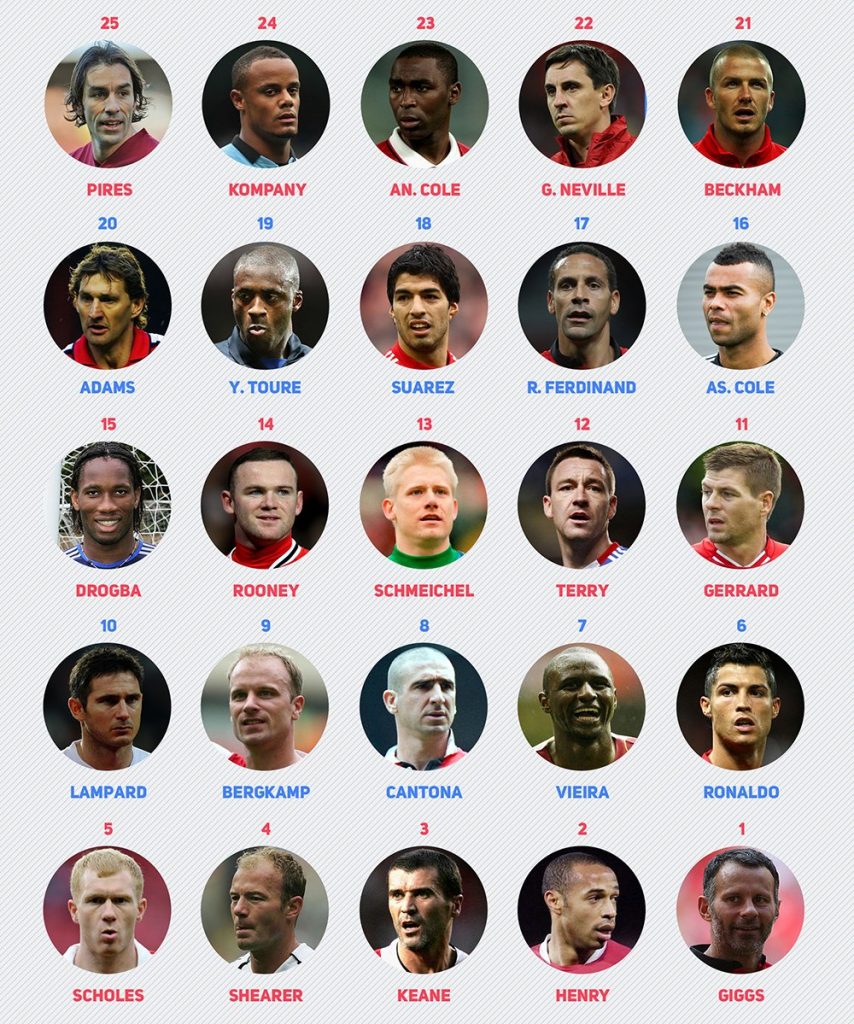
The Emerging Force
Although the most dominant team after in the second half of the 90s was also Manchester United with three consecutive titles from 1999 to 2001, this was the time when we saw another emerging force – Arsenal.
The Gunners won their first Premier League title in the Premier League in the first full season under their new manager Arsene Wenger. Wenger became the third manager after Ferguson and Dalglish to lift the EPL trophy. Once again, Manchester United was left behind by only one point, just like in the 94-95 season when they finished behind Blackburn.
The next title for Arsenal came in 2001-2002 season, after the three consecutive titles won by the Red Devils. The core of the team remained the same with players like Patrick Vieira, Martin Keown, Ashley Cole, Robert Pires, Freddie Ljungberg, Dennis Bergkamp, Sylvain Wiltord, Lauren and the goalkeeper David Seaman. However, the addition of Thierry Henry a couple of years before the second title, one of the top scorers in the history of the league, was a welcome bonus.
The Invincibles
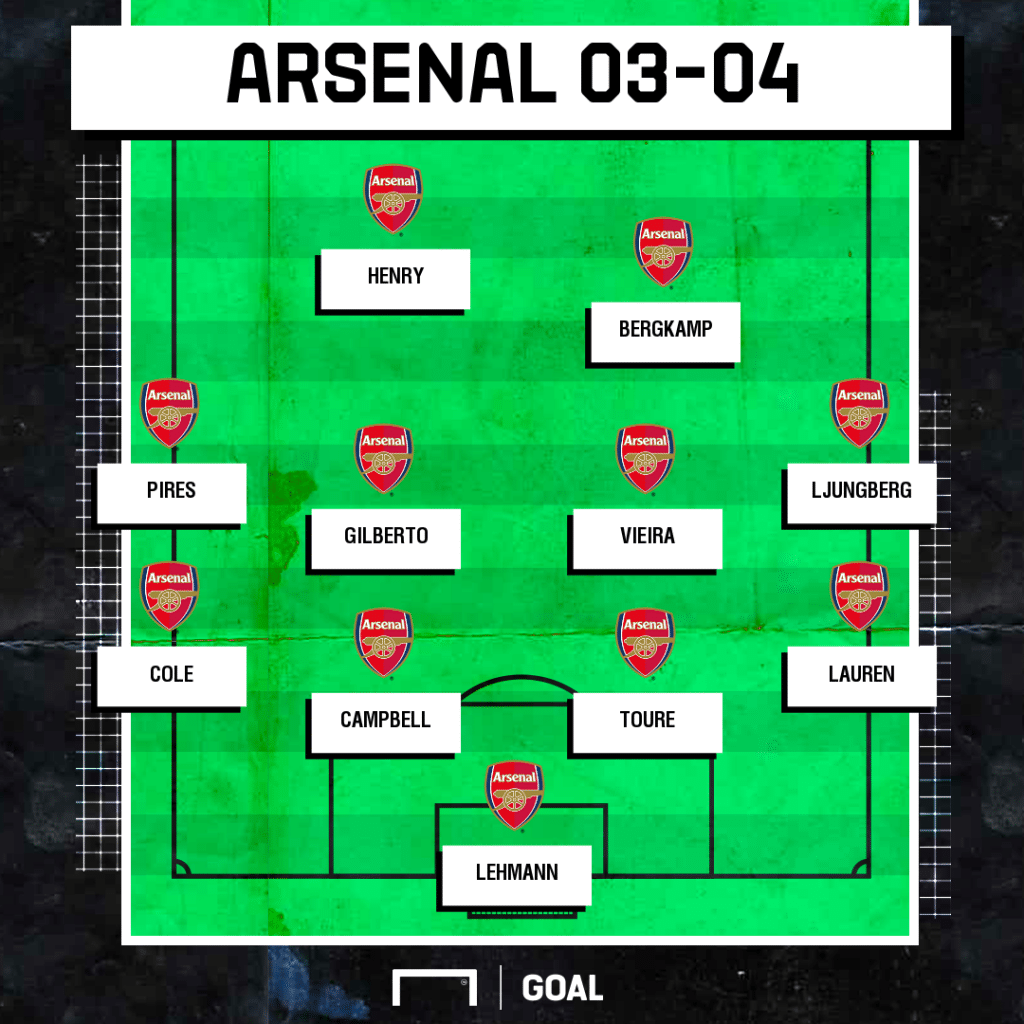
The season 2002-2003 saw the familiar champions – Manchester United. This was their 8th title in the 11 Premier League season, despite trailing behind Arsenal all the way until the end of March. The new Red Devils were led by Ruud van Nistelrooy, the top scorer of the season with 25 goals.
The team also featured prominent names like the goalkeeper Fabian Barthez, Juan Sebastian Veron, Rio Ferdinand, Ole Gunnar Solskjaer, Diego Forlan, etc. Of course, the core of the previous seasons was also here in players like Keane, Beckham, Scholes, Giggs and the Neville brothers.
The next Premier League season brought us a unique feat – Arsenal won the title without a single defeat. It was the only the second time in the history of English football after Preston North End did the same in 1889. However, Arsenal remained undefeated in a 38-game season, while Preston only played 22 games without losing. Unfortunately for the Gunners, this was their swan song since it was the last Premier League title that the team won.
The New and the Old Elite

With Premier League growing stronger with each passing year and TV revenues getting bigger and bigger, many teams saw a change of ownership since buying a Premier League club quickly became a smart investment. One such change occurred in 2003, when Chelsea was bought by a Russian billionaire Roman Abramovich, who was determined to bring the top-tier title to the club who never won it before.
In 2004-2005 season, after two years of heavy investments and many personnel changes, Chelsea were finally crowned football champions of England. The team managed to win 95 points en route to the title, which was the record number of points at the time. They also won the most games in a single season, with 29 wins. This Chelsea team repeated the feat the next season, led by the goalkeeper Petr Cech, Claude Makelele, Michael Essien, Frank Lampard, Hernan Crespo, Didier Drogba, Arjen Robben, John Terry, etc. Both titles were won under the guidance of Jose Mourinho.
After these two consecutive titles, the “new elite” stepped aside for the “old elite” as Manchester United once again won three titles in a row. Led by the new superstar Cristiano Ronaldo and other world-class players like Nemanja Vidic, Patrice Evra, Wayne Rooney, Louis Saha, Dimitar Berbatov and a few familiar faces like Scholes and Giggs, the Red Devils dominated the competition once again. Before the start of the 2009-2010 season, Cristiano Ronaldo joined Real Madrid for £80 million, a world record transfer fee at the time.
Far East Money
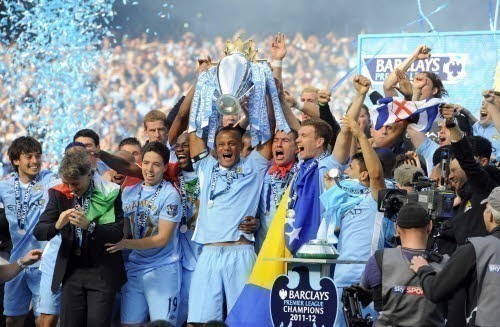
Chelsea and Manchester United both won a title each in 2010 and 2011, before being outshined by the new kid on the block, Arab-funded Manchester City. After spending an outraging amount of money in the years after the purchase of the club in 2008 for £210 million, the Abu Dhabi United Group finally saw their investment pay off in the spectacular finish of the 2011-2012 Premier League season.
In what was probably the most shocking ending to a football season in any league, City won its first Premier League title after beating QPR in the final match. City and United went into the last match tied but City had the better goal difference. While United secured the win against Sunderland a bit earlier, City entered the stoppage time with a 2-1 deficit. However, they managed to score two goals before the end of the game, with the title-winning goal coming only 15 seconds after the end of the United’s game.
United bounced back the following season, winning their 13th and ultimate Premier League title to date before saying goodbye to Sir Alex Ferguson who retired on a high note at the end of the season. The next season we saw the 2nd title for City after they finished just two points ahead of Liverpool.
Cinderella Story
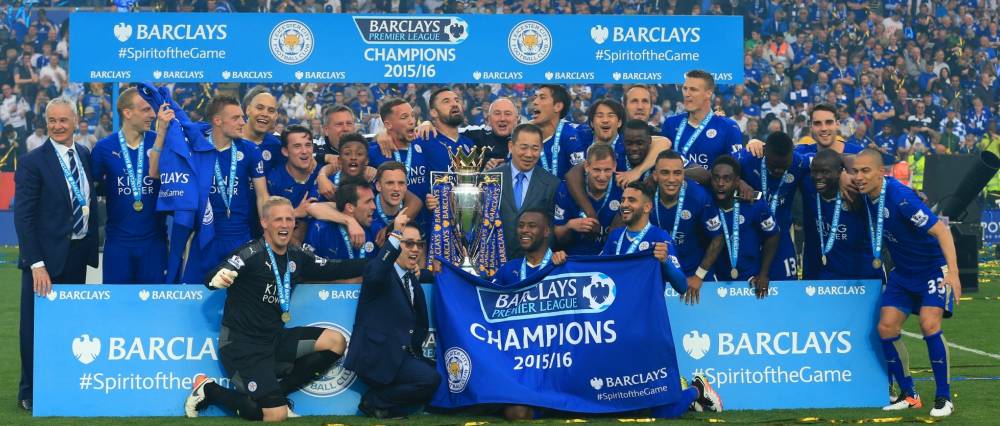
After returning to the place of success, Jose Mourinho immediately brought Chelsea back to the winning track with a title in 2014-2015. At the same time, we saw a miraculous comeback from the brink of relegation of Leister City, a feat that was only a forecast of the even bigger miracle yet to come.
Before the start of the 2015-2016 season, Leicester City fired manager Nigel Pearson, the man who managed to keep them in the Premier League after bringing them into the league in the first place. The reason behind this was a racist scandal involving his son and a player at the club. Leister City brought Claudio Ranieri as a replacement, a man who never won a title in his career despite being in charge of some prominent teams like Inter Milan, Juventus, Roma, Valencia, Chelsea, etc.
Ranieri came to Leicester after a debacle with the Greece national team where he managed to lose to the Faroe Islands at home. The odds for Leicester City winning the title were set at 5000 to 1, which was not surprising for a team that was supposed to fight relegation.
However, led by Jamie Vardy, a man who played for a non-league club only a few years before and a plethora of castaways and cheap signings like Riyad Mahrez, N’Golo Kante, Mark Albrighton, Kasper Schmeichel, Robert Huth, Wes Morgan and Danny Drinkwater, Leicester started the season strong, getting to the top of the league after a few games.
Despite all predictions and expectations, Leicester City managed to stay on top until the end and win the first-ever top-tier title in the club history. Many dubbed this the most surprising title in the history of football, with every right.
Back to Reality
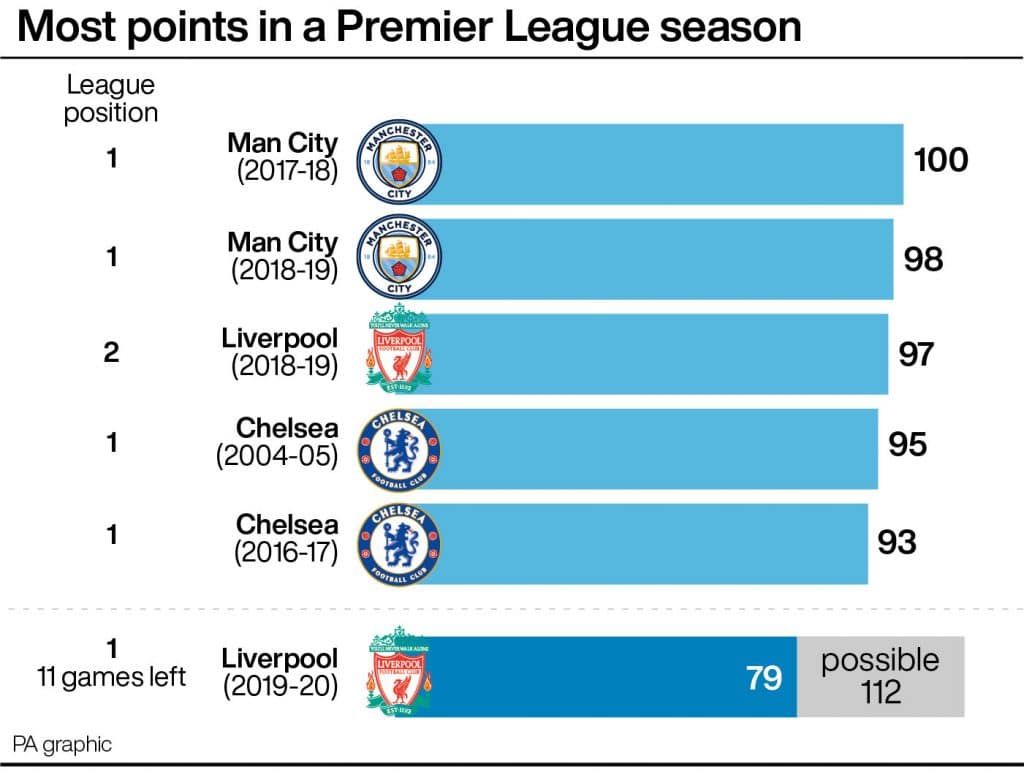
After they shook the entire world with their amazing performance and title, Leicester City came back to Earth the next season. Spread thin between Champions League and domestic competitions, the club was in the relegation fight after more than half games have been played and Ranieri finished his fairytale by getting sacked. Leicester ultimately remained in the Premier League, while the title went back to London in the hands of Antonio Conte and Chelsea.
After two years without a title, Manchester City was determined to get back to the top by singing Pep Guardiola as their manager in 2016. While he failed to bring the title home in his first season, he managed to win two consecutive titles in 2018 and 2019.
The 2017-2018 title was particularly impressive for the Citizens since they have broken many records en route. They were the first team in the history of English football to surpass 100 points in a single season, they won the record-breaking 32 games, setting the record for most consecutive league wins with 18, highest goal difference, etc.
The next season was equally impressive since City won the title with 98 points, just two points shy of their previous record. However, they fought for the title until the last minute of the season since Liverpool was only a point behind them in the end. With 97 points, Liverpool became the team with the most points won that finished 2nd in the league.
Premier League Records
- Most Titles by a Team – Manchester United, 13
- Most Titles by a Manager – Alex Ferguson, 13
- Most Titles by a Player – Ryan Giggs, 13
- Most Points in a Season – Manchester City in 2017-2018, 100 points
- Most Wins in a Season – Manchester City in 2017-2018, 32 wins
- Most Consecutive Wins – Manchester City, Liverpool, 18 wins
- Most Goals Scored in a Season by a Team – Manchester City in 2017-2018, 106 goals
- Most Appearances – Gareth Barry, 653
- Most Goals Total – Alan Shearer, 260
- Most Consecutive Matches Scored In – Jamie Vardy, 11
- Most Goals in a Season with 42 Games – Andy Cole, Alan Shearer, 34 goals
- Most Goals in a Season with 38 Games – Mohamed Salah, 32
- Most Hat-Tricks – Sergio Aguero, 12
- Most Hat-Tricks in a Season – Alan Shearer, 5
- Most Goals in a Game – Cole, Shearer, Berbatov, Defoe, Aguero, 5 goals
- Most Assists – Ryan Giggs, 162
- Most Assists in a Season – Thierry Henry, 20
- Most Clean Sheets – Petr Cech, 202
- Most Clean Sheets in a Season – Petr Cech, 24
- Most Player of the Season Awards – Nemanja Vidic, Thierry Henry, Cristiano Ronaldo, 2 awards
The Future of the EPL
With the constant flow of the TV revenue money, the future of the English Premier League looks as bright as ever. The rise in popularity that this league saw since its inception in 1992 is remarkable and a true statement to the power of marketing combined with the love of football worldwide.
And even though it is hard to predict the long-term stability and success of a football league, especially since things can change as the fall of Italian Serie A proved, it seems that the Premier League is pretty secure.
Clubs in the EPL receive huge amounts of money just for participating in the league, which is why the final of the Championship playoffs is dubbed “The most expensive football game”. The winner gets to join the elite company and lots of cash, while the loser has to grind again in the second-tier league of English football.
Football has been more business than a sport for a long time now and business always revolves around profit. As long as the English Premier League remains insanely profitable, its place in the top sports leagues in the world is safe.


